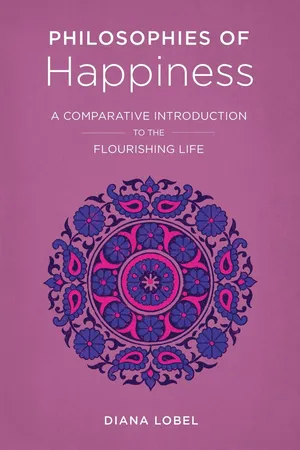
Philosophies of Happiness
A Comparative Introduction to the Flourishing Life
- English
- ePUB (mobile friendly)
- Available on iOS & Android
About this book
What does it mean to be truly happy? In Philosophies of Happiness, Diana Lobel provides a rich spectrum of arguments for a theory of happiness as flourishing or well-being, offering a global, cross-cultural, and interdisciplinary perspective on how to create a vital, fulfilling, and significant life. Drawing upon perspectives from a broad range of philosophical traditions—Eastern and Western, ancient and contemporary—the book suggests that just as physical health is the well-being of the body, happiness is the healthy and flourishing condition of the whole human being, and we experience the most complete happiness when we realize our potential through creative engagement.
Lobel shows that while thick descriptions of happiness differ widely in texture and detail, certain themes resonate across texts from different traditions and historical contexts, suggesting core features of a happy life: attentive awareness; effortless action; relationship and connection to a larger, interconnected community; love or devotion; and creative engagement. Each feature adds meaning, significance, and value, so that we can craft lives of worth and purpose. These themes emerge from careful study of philosophical and religious texts and traditions: the Greek philosophers Aristotle and Epicurus; the Chinese traditions of Confucius, Laozi, and Zhuangzi; the Hindu Bhagavad G?t?; the Japanese Buddhist tradition of Soto Zen master D?gen and his modern expositor Shunryu Suzuki; the Western religious traditions of Augustine and Maimonides; the Persian Sufi tale Conference of the Birds; and contemporary research on mindfulness and creativity. Written in a clear, accessible style, Philosophies of Happiness invites readers of all backgrounds to explore and engage with religious and philosophical conceptions of what makes life meaningful.
Visit https://cup.columbia.edu/extras/supplement/philosophies-of-happiness for additional appendixes and supplemental notes.
Frequently asked questions
- Essential is ideal for learners and professionals who enjoy exploring a wide range of subjects. Access the Essential Library with 800,000+ trusted titles and best-sellers across business, personal growth, and the humanities. Includes unlimited reading time and Standard Read Aloud voice.
- Complete: Perfect for advanced learners and researchers needing full, unrestricted access. Unlock 1.4M+ books across hundreds of subjects, including academic and specialized titles. The Complete Plan also includes advanced features like Premium Read Aloud and Research Assistant.
Please note we cannot support devices running on iOS 13 and Android 7 or earlier. Learn more about using the app.
Information
Table of contents
- Cover
- Title Page
- Copyright
- Dedication
- Contents
- Acknowledgments
- Introduction
- One. Aristotle: The Life of Engaged Activity
- Two. Epicurus: Happiness Is Pleasure
- Three. Confucian Happiness: Ritual, Humaneness, Music, and Joy
- Four. Daoism: Attentive Awareness and Effortless Ease of Action (Wu-Wei)
- Five. The Bhagavad Gītā: Non-attached Action and the Universal Spirit
- Six. St. Augustine: The Happy Life of the Soul
- Seven. Maimonides: The Joy of Learning, Prayer, and Devotion
- Eight. The Sufi Path of Love in ʿAṭṭār’s Conference of the Birds
- Nine. Mindfulness, East and West
- Ten. Dōgen’s Sōtō Zen and Shunryu Suzuki’s Zen Mind, Beginner’s Mind
- Eleven. Creative Engagement and the Art of Living
- Conclusion
- Notes
- Bibliography
- Index